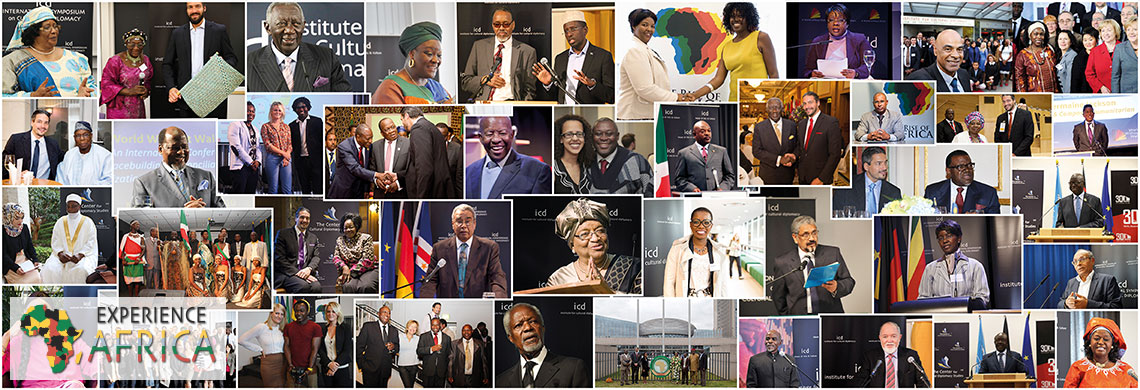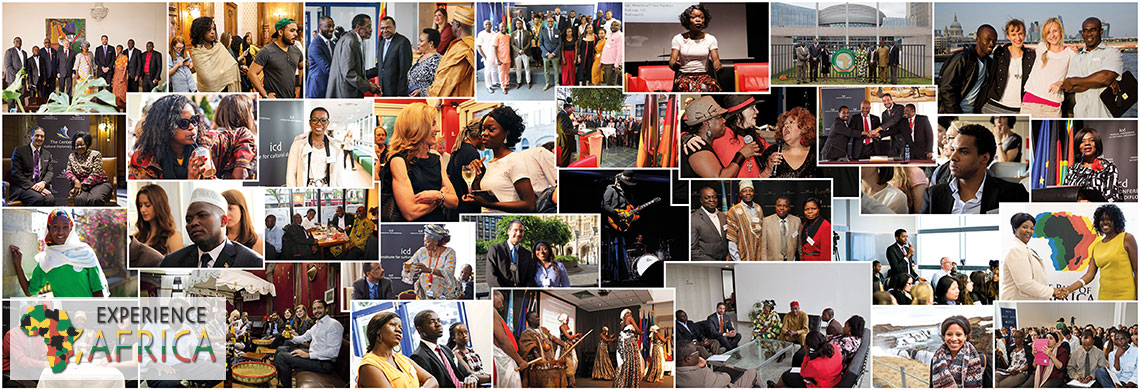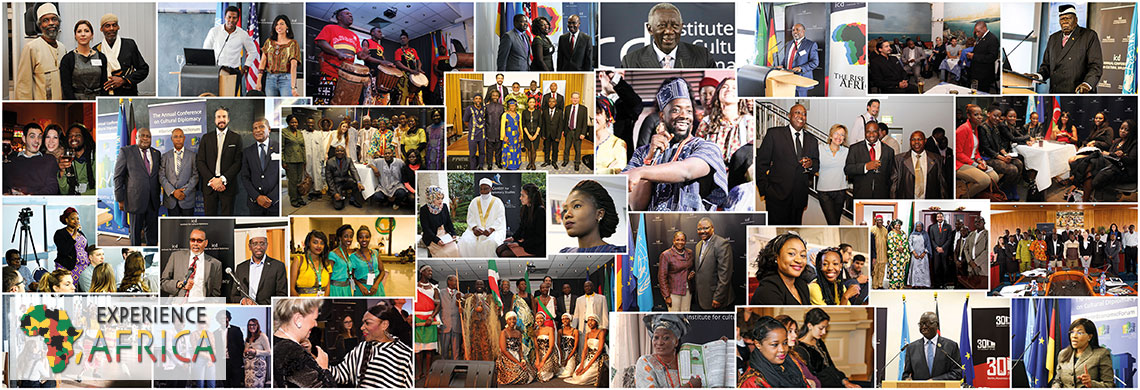The ICD “Experience Africa” Program
The Assembly of the African Union

The Assembly of the African Union
History
Comprised of the heads of state from all organization members, the Assembly is the supreme organ of the African Union (AU) and direct successor to the Organization of African Unity (OAU). The Assembly came into existence from the birth of the both the AU and the OAU and, as a foundational component, its history is closely linked to the histories of the organizations themselves.Founded by the 32 independent African states at the time, the OAU and its Assembly were signed into being on the 25th of May 1963 with a mandate to build unity amongst its members, defend the sovereignty of each African state and eliminate all forms of colonialism on the continent. The formation of the organization was a direct product of the nationalist sentiment on the African continent which had been gaining significant momentum since the end of the Second World War. The idea of African Unity and pan-Africanism as a whole can trace its roots back to the time of W.E Dubois (insert hyperlink) in the 19th Century but only began to be realized as a political reality with the wave of independence which started in 1940s. The tireless work of the continent's state-builders such as Dr. Kwame Nkrumah of Ghana, Leopold Sedar Senghor of Senegal, and Haile Selassie of Ethiopia, did not just stop at national independence and collectively they believed that the prospects for the successful development and continued independence of African states rested upon a united continent.
In 1958 Dr. Nkrumah organized the First Conference of Independent African States and an All African People's Conference and with it the seeds of a pan-African institution, one free from external intervention, were sown. The inception of this organization was not free from contention and the newly independent African states were divided into two camps; the first group favored a strong and rapid integration with complete unity and even a unified African army whilst the second advocated a slower, more incremental approach to African unity.
In the May of 1963 however, despite the differences, these two groups came together in the Ethiopian capital of Addis Ababa and reached an agreement on the future of continental cooperation, thus the first independent pan-African organization was born, the Organization for African Unity.
Pulling away from a colonial history that stifled democratic norms and institutions, the newly formed OAU instated an assembly as its sovereign body, one where final decisions where to be made by a democratic majority of all its member states. Indeed, the Assembly was signed into being on May 1963 with the very establishment of the OAU.
Over time the OAU grew, both in terms of members and mandate, and moved away from the central focus on African sovereignty. As the organization matured and African independence was firmly secured, the OAU began to incorporate more global and forward looking aims. It took upon the furthering of good governance, economic development, and social progress amongst its objectives and took action to support self-reliance, cooperation, coordination, and development amongst economies. It made efforts to support human rights, root out corruption, insist upon constitutional governments and encourage popular participation in politics. With the aims of the organization becoming more ambitious, it became apparent that the existing framework needed revamping if it was to effectively meet its new mandate. Accordingly, in July 1999, the OAU called an "extraordinary session" at Sirte, Libya with the intention of establishing a new African union, one with an expanded structure bringing under its aegis other pan-African institutions. The session ended in the signing of the Sirte Declaration promising to establish a new pan-African organization, the African Union.
Within a year the OAU was disbanded and replaced by the African Union with the signing of the African Union Constitutive Act. Although reaffirming African sovereignty, the AU included new objectives and purposes in its constitution; economic development that can be sustained over time, good governance, social justice, gender equality, youth development, and good health. The new union included new bodies such as a Pan-African Parliament, a court of justice, a commission, and a permanent representatives' committee, however the Assembly remained the supreme organ of the organization and remained a democratic body.
Structure
The General Assembly is the supreme operating unit or organ of the African Union (AU). The assembly is composed of African heads of states and governments or their accredited representatives who meet together in order to debate and pass resolutions. The assembly meets at least once a year for ordinary sessions, however a member state can request an additional meeting if approved by a two-third majority of member states. The Assembly is overseen by the Chairman of the Assembly, a position elected by majority and held for one year by a head of state or their representative. Although the Assembly hosts the final vote on resolutions, they more often than not originate in other agencies and committees, coming to the assembly from the Executive Council of Ministers only after the council has held a primary vote on any given resolution.The functions of the Assembly are to determine the common policies of the Union, establish its priorities, and adopt its annual program. The Assembly further monitors the implementation and decisions of the Union and decides upon any and all intervention in a member state in the event of war crimes, genocide and crimes against humanity. The Assembly has a role in accelerating the political and socio-economic integration of the continent and give directives to the Executive Council, the PSC of the Commission on the management of conflicts, war, acts of terrorism, emergency situations and the restoration of peace. Other formal roles are to establish the budget of the Union, to consider requests for membership, to establish any new organ of the Union, and to appoint or terminate the appointment of the judges at the Court of Justice.
Agendas and Trends
The process of decision-making starts with the meeting of the Permanent Representatives before moving to the Executive Council, finally requiring ratification by the Assembly. Although the Assembly has final say on all resolutions, like all international organizations the groundwork for negotiations and decision-making is done by lower-level representative to ensure practical efficiency and any resolution must first pass a vote by the Council. The African Union often works through summits -meetings of high-level institutions culminating in the meeting of the heads of member states.Historically the Assembly of the OAU has overseen many momentous decisions, many of which have had positive ramifications. The Assembly managed to mediate conflicts between Algeria and Morocco in 1964 and 1965 and has continually helped resolve conflict in the disputed regions in the Horn of Africa, managing disputes between Somalia, Ethiopia and Kenya. The Assembly was also most effective in supporting movements against white minority rule in South Africa and Namibia, successfully barring South Africa from the UN General Assembly and other UN Agencies.
An important summit reflecting the broader remit of the AU was the 8th African Union Summit which took place from January 22 until January 30, 2007. The summit discussed three important challenges which the African continent is facing: climate change, food security and science & technology. In response to climate change the Assembly implemented the "Climate Information for Development Needs" action plan calling the African Development Bank to develop and implement the plan. In addressing food security the Assembly endorsed a raft of initiatives, including a resolution to allocate at least 10% of member state's national budgets to agriculture and a commitment to reducing the continent's annual expenditure of USD 20 billion on agricultural imports.
Another landmark debate occurred in July 2007 with a summit convened on the the idea of a Pan-African Government, the aim of which would be greater supra-national governance. This was a contested issue, with many leaders calling for stronger governing powers of governing potentially moving towards a continental government. The opposition was just as fierce as the advocacy, however Senegalese President Abdoulaye Wade passionately defended the idea, stating: "The slow approach towards the formation of the African Union Government is a fallacious arguments intended to slow down the process".
More recently the AU celebrated 50 years of organized pan-African unity at the 21st summit, May 2013. The summit made important steps towards the economic independence of the AU as, although politically independent for the best part of half a century, the largest proportion of the organizations budget is still sourced from outside donors. The dependence of the AU on external sources has historically been seen as a setback to pan-Africanism, however during the 21st summit the Assembly, led by South African President Jacob Zuma, spearheaded moves to raise internal African funding for the AU. The Assembly established the High-Level Panel on Alternative Sources of Funding the African Union which has since made a number of innovative proposals. The Chairperson of the AU committee said of the Assembly's decision:
"It can't be business as usual. We can't continue to depend on outside help. Yes, outside help is crucial and greatly appreciated, but we must also look at ways of making ourselves independent. Therefore, it is very important that we also fund ourselves and our programmes".
Outside of the summits a number of sessions have been resolved by the Assembly. Most recently an extraordinary session was held in October 2013 where Africa's relationship with the International Criminal Court (ICC) was discussed. This session took place after the African Union requested deferment of indictments against the Kenyan President and Vice President. The Assembly decided on this matter that: No charges shall be commenced or continued before any international court or tribunal against any serving head of state or Government or anybody acting in such capacity during his/ her term of office. To safeguard constitutional order, stability and integrity of member states, no serving AU Head of state shall be required to appear before any international court or tribunal during their term of office". The Assembly thereby stated that the indictment of the Kenyan President and Vice President is the first time a sitting Head of State and his deputy is being tried in an international court, and stressed the "gravity of such a situation, which could undermine the country's sovereignty, stability, and peace". According to the Assembly, the proceedings against the Kenyan President would distract and prevent him from fulfilling their constitutional responsibility, especially in the light of the fight against terrorism in Kenya. Ethiopian Prime Minister Hailemariam Desalegn, who is the Chairperson of the African Union, said in a statement to his colleagues: "Our goal is not and should not be a crusade against the ICC, but a solemn call for the organization to take Africa's concerns seriously", he added. The Assembly in the end agreed on the fact that Kenya should send a letter to the United Nations Security Council (UNSC) requesting the deferral, in conformity with Article 16 of the Rome statute, of the proceedings against the President and Deputy President of Kenya. This letter would be than endorsed by all African States parties.



